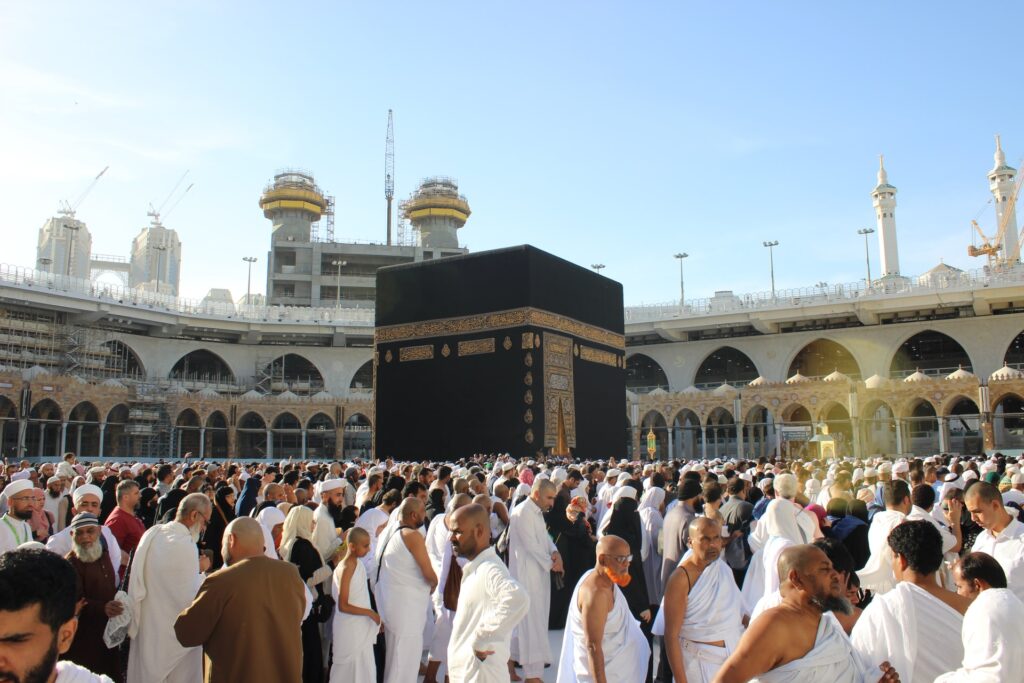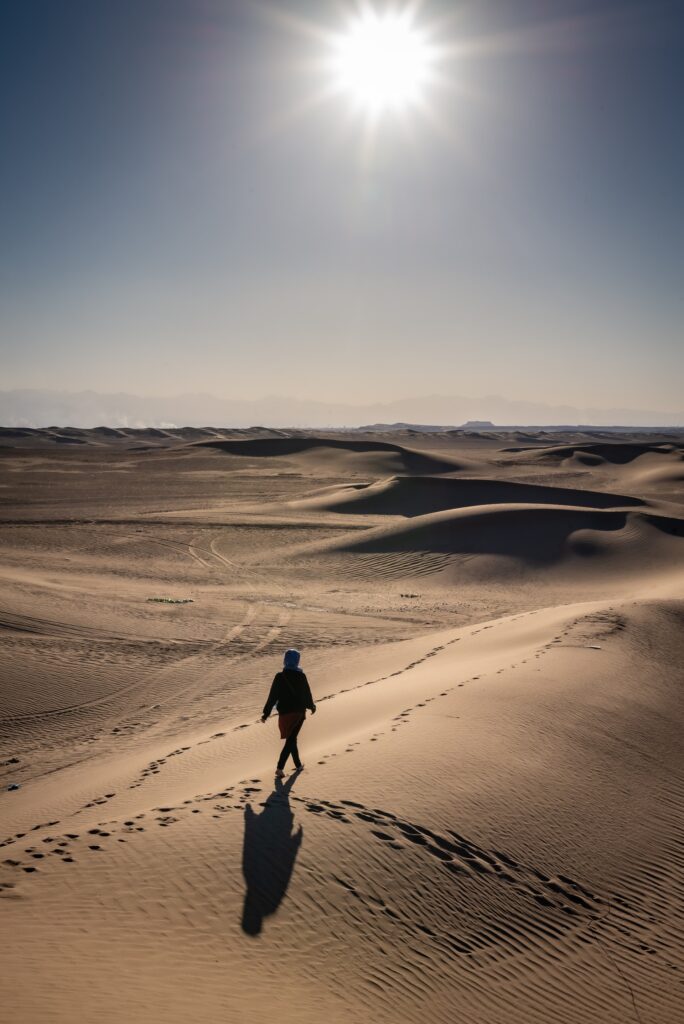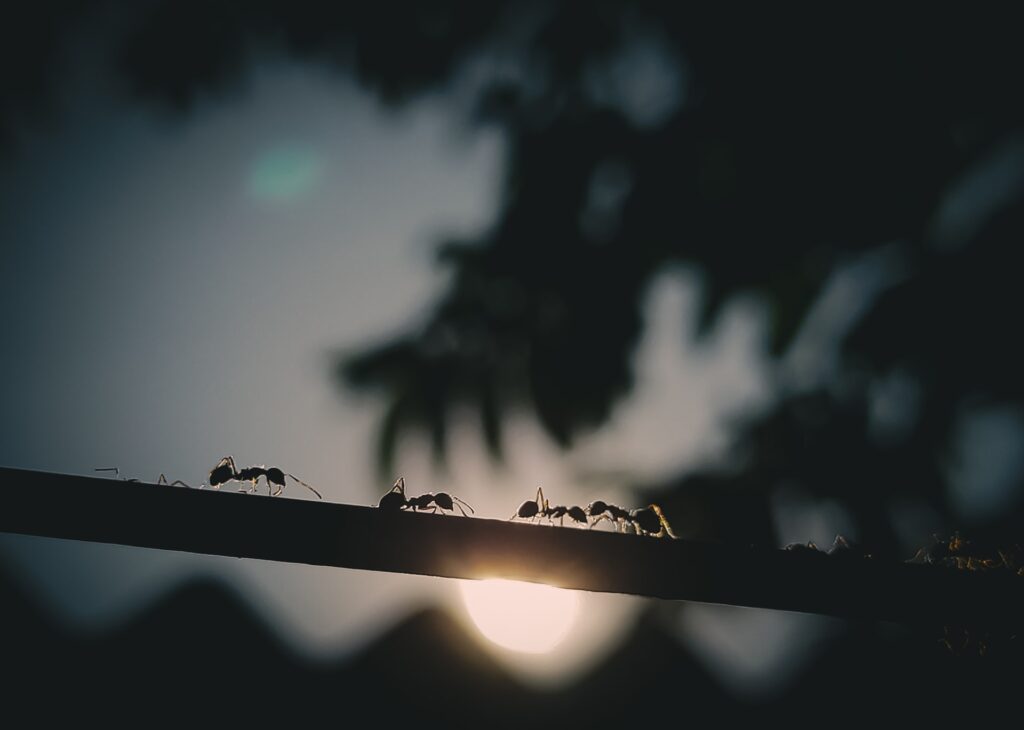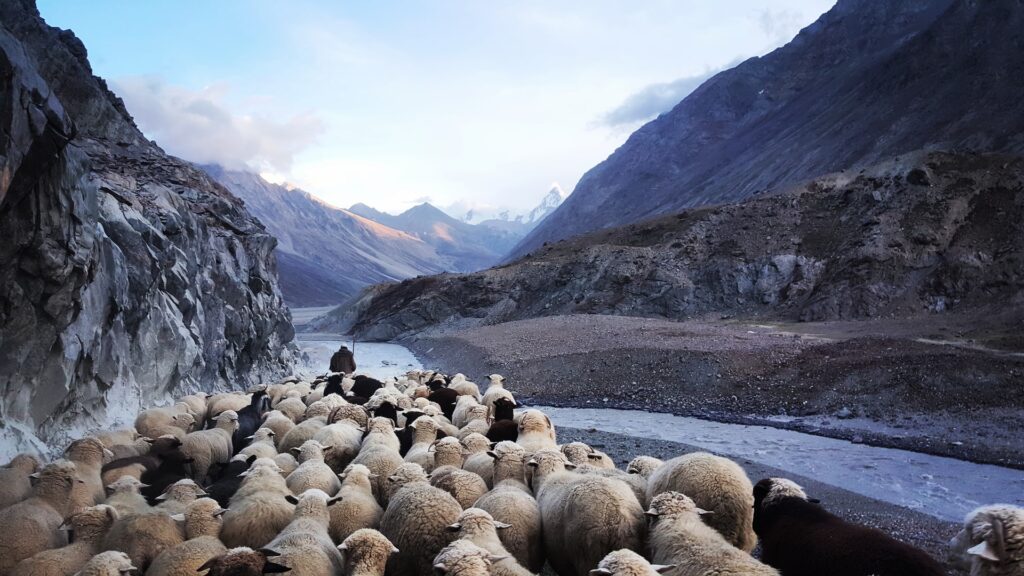I see two main benefits from extracting duas (supplications) from the Quran.
Firstly, they are taught by Allah Himself.
It’s not always easy to find the appropriate wording to address the Creator of the skies and the earth!
His words will always be more efficient than ours.
Secondly, these duas come with a context that gives them more meaning.
Understanding the context allows us a better appreciation of what we’re saying.
The five duas I’ve picked cover different topics: asking for the good, the intellect, the heart, thankfulness, family, and being in spiritual need.
Dua 1

“Our Lord! Grant us the good of this world and the Hereafter, and protect us from the torment of the Fire.” [Quran 2:201]
With this dua, Allah is teaching us what we should ask for.
Before this verse, Allah expressed His discontent with some Muslims.
They go to hajj (pilgrimage), and all they ask for is worldly stuff.
They are in the best place to ask for what will benefit them, but they don’t.
The love of this world is deeply rooted in their hearts. Even the pilgrimage can’t take it out.
The worst is that Allah gives them some of what they’re asking for—more stuff in this world.
As He said:
“If anyone desires a harvest in this world, We shall give Him a share of it, but in the Hereafter he will have no share.” [Quran 42:20]
Our duas require prioritization.
First and foremost, we ask for guidance.
The climax of surah al-Fatiha reminds us of this point:
“Guide us to the straight path.” [Quran 1:6]
Asking for the good of this world is not limited to material things. This is a narrow understanding.
The Arabic word used for good is hasana.
It was also used to describe the role model of the Prophet (s):
“The Messenger of God is an excellent model for those of you who put your hope in God and the Last Day and remember Him often.” [Quran 33:21]
The best thing we can have in this world is to follow in his footsteps.
It is then logical to get the best outcomes from both worlds.
When making dua, the last thing we want is to miss the primary by focusing on the secondary.
Dua 2

“Our Lord, do not let our hearts deviate after You have guided us. Grant us Your mercy: You are the Ever Giving.” [Quran 3:8]
This dua marks the difference between the perverse at heart and the people of intellect.
Allah described the perverse at heart as those looking for ambiguities in the scripture.
They’re trying to come up with meanings of their own.
He then contrasted those with the firmly grounded in knowledge.
He calls them ulul albab — people of intellect.
These are pure-minded people who engage in reflection.
They have control over their emotions so as to think clearly.
The Arabic word for intellect is aql, which means to tight something.
Its opposite is jahl, which is commonly translated as ignorance.
For example, the pre-Islamic period in Arabia is called jahiliyyah — The time of Ignorance.
However, the primary meaning of jahl is irascibility.
Behaviors become guided by honor, arrogance, excess, pride, and tendency to violence and retaliation.
So in Islam, no matter how much knowledge you have, you are an ignorant if emotions dictate your actions.
It shows that the intellect is of no use.
The people of intellect are different.
The more they increase in knowledge, the more they worry about their heart.
They put extra effort into remembering Allah so that their hearts remain clean.
Without a clean heart, the mind will remain clouded.
Today, we do not only need help for cleaning our hearts but also our minds.
How can we engage in high thinking with minds filled with junk?
Dua 3

“My Lord! Inspire me to be thankful for the blessings You have granted me and my parents, and to do good deeds that please You; admit me by Your grace into the ranks of Your righteous servants.” [Quran 27:19]
The Prophet Suleiman (Solomon) made this dua.
What triggered it is an event we might consider insignificant.
Suleiman was marching with his army.
They went down a valley filled with ants.
At this point, Allah recorded the conversation ants were having.
A female ant was asking everyone to go back to their homes. Otherwise, Suleiman’s army would crush them without realizing it.
We also learn that ants have knowledge. They knew Suleiman by name and acted accordingly to avoid his army.
Allah gave Suleiman the ability to hear the ants’ conversation.
He was amazed by it and couldn’t hold his laughter.
Why was he amazed by such a little ability?
Suleiman was a powerful king. His army was composed of humans, jinn, and birds.
Yet, the moment he realized he gained a new ability, he asked Allah to help him be thankful.
In a famous quotation, Lord Acton said:
“Power corrupts; absolute power corrupts absolutely.”
But here we have a king aware of the dangers of power.
He relies on Allah to keep him thankful, even for the little things.
As thankfulness is not merely words, he’s asking Allah to help him do good deeds.
And a deed is only good when it’s God-pleasing.
Dua 4

“Our Lord, give us joy in our spouses and offspring. Make us good examples to those who are aware of You.” [Quran 25:74]
The Arabic expression used for ‘joy’ is the coolness of the eyes.
Believers ask Allah to give them calm and peace when they look at their spouses and children.
To make them so happy with them that they want to cry out of joy.
When they are outside, the believers see and hear all kinds of things that are not God-pleasing.
But once at home, they are pleased with what they see and hear.
Also, it seems that their thoughts go beyond their immediate family.
They are thinking about their entire lineage.
The revelation changed the worldview of these believers.
They start realizing that their actions can affect far more than their direct family.
So they ask Allah’s help for this heavy responsibility.
Our actions have a life of their own after our death.
“We record what they send ahead of them as well as what they leave behind: We keep an account of everything in a clear Record.” [Quran 36:12]
When we think about it, it’s a crushing responsibility.
It’s not a surprise that the heavens, the earth, and the mountains rejected it:
“We offered the Trust (moral responsibility) to the heavens, the earth, and the mountains, yet they refused to undertake it and were afraid of it; mankind undertook it — they have always been very inept and rash.” [Quran 33:72]
Without Allah’s help, we can’t fulfill our responsibilities properly.
The coolness of the eyes comes with consistent work and effort.
May Allah help us all be good examples to those around us!
Dua 5

“My Lord! I am truly in a dire need of whatever good thing You may send me.” [Quran 28:24]
This dua was made by Moses (as).
Moses mistakenly killed an Egyptian.
Then he learned that the Pharaoh is conspiring to kill him.
So he escaped to Midian.
Upon his arrival at Midian’s waters, he saw a crowd with their flock.
Far from this group, he noticed two women struggling to keep their flock back.
So Moses went to them and asked: What’s your problem?
They replied: We can’t water our flocks until the crowd is done.
So Moses grabbed their sheep, went to the water, gave them a drink, and brought them back.
He then walked away going back to the shed.
If we forget the context, we might not find this story exceptional.
Moses had just arrived from a long journey across the desert. He must be exhausted.
Yet, as soon as he saw an opportunity for good, he went after it.
Why?
This dua explains it.
He’s basically saying to Allah I’m bankrupt. Any good deed that you send my way, I’m in desperate need of.
In the Wisdom article, we saw how important it is to be in a state of spiritual impoverishment and need for God.
As Ibn Ata’Allah wrote:
If you want to receive gifts, then perfect your spiritual poverty and desperate need: “Alms are only for the poor.” [9:60]
If a Prophet is in dire need, what does it say about us?
Article published: January 17, 2022
Popular Articles
- 7 Lessons from Luqman that Will Make You Wise
- How to Enjoy Salat and Make it Meaningful
- Mongols Invasions: Some Forgotten Lessons to Today’s Muslims
- For or Against Vaccines? That’s Not Really the Question
- Are Muslims Meant to Be Sleep Deprived?
- Islamic Psychology: A Model Where Faith Has Its Place
- Muslims Judging Each Other: Why and How to Be Less Judgy
- The Certainties of Muslims in Uncertain World
- Allah According to Allah: The Beauty Behind the Verse of Light
- Blindness: From the Invisible Gorilla to the Quranic Perspective
- How to Make People Change their Mind: Persuasion!
